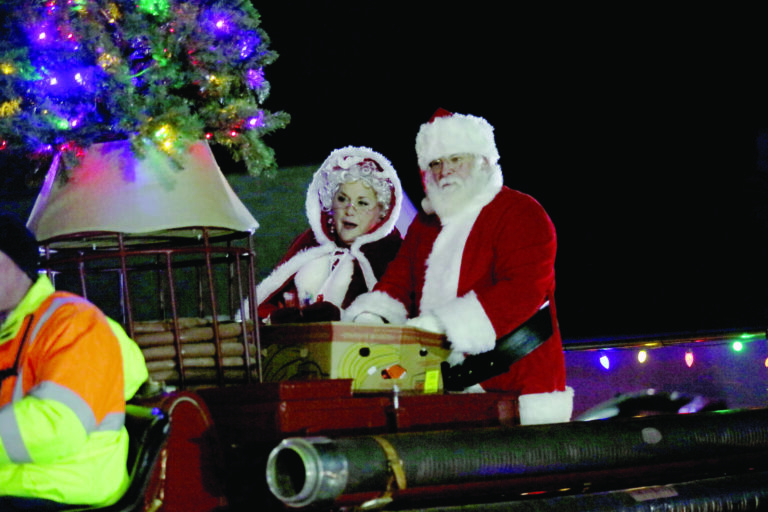Wastewater residual use may be protected by ‘Right to Farm’
By Sheila Harris [email protected]
Rural Cassville resident Joey Rose is adamantly against the land-application of wastewater residuals by Arkansas-based Denali Water Solutions (Denali) and Synagro in southwest Missouri.
“I want to help get it stopped,” he said. “I’ve been around farmers all my life, and we know that if something is free, something is wrong with it.”
While Rose’s perspective is shared by a growing number of southwest Missouri residents, others go about their farming operations in disregard of their neighbors’ poor opinions of their practices. One such Barry County property-owner, whose name is being withheld, says he uses the wastewater residuals on his land for economic reasons.
“It’s just chicken guts. It can’t hurt anything,” the landowner said.
As for the smell of the poultry residuals, he says if his neighbors don’t like it, they can pay for his next round of fertilizer.
Do his neighbors have recourse? Probably not, as laws currently stand.
In 2014, Missouri voters narrowly approved a legislatively-referred state constitutional amendment called “Right to Farm.” The proposed amendment was sponsored in the Missouri House by Newton County’s then-Representative Bill Reiboldt, R-Neosho. The measure met with approval from both House and Senate, and was placed on the ballot for the Aug. 4 primary election that year.
At face value, it sounded positive for owners of family farms. It was presented as guaranteeing “farmers and ranchers the right to engage in their livelihoods and produce food for others.”
However, according to Ballotpedia, that right was already guaranteed in Missouri’s constitution.
Campaigning became heated, confusing and controversial.
Opponents to the proposed amendment contended that the measure would provide protection to large corporate and multinational agribusinesses, and “would, in fact, make it harder for family farmers and ranchers to protect themselves from [large] business interests,” Ballotpedia said.
Vocal proponents of the amendment, which included Missouri Farmers Care (of which Monsanto was a member) and Missouri Farm Bureau raised the specter of out-of-state boogeymen, declaring that family farms needed protection from outside influences in order to continue their ways of life.
At the ballot box, the amendment passed (after a recount) with only 50.12 percent of the vote.
Eight years later, those out-of-state boogeymen are here.
With the terms of the amendment firmly in place, dead chicken scraps from northwest Arkansas are roosting on southwest Missouri soil, delivered by national, out-of-state corporations who can operate with impunity because of Missouri’s codified constitutional language which grants protection from nuisance suits to facilities “used in the production or processing of crops, livestock, swine, poultry, livestock products, swine products, or poultry products.”
Barry County Southern Commissioner Gene Robbins is another resident concerned about the land-application of wastewater residuals by Denali.
“We don’t know what’s in that stuff,” he said. “I’m not for telling people what they can put on their land, but if it’s harming their neighbors, then it needs to stop.”
Stopping in actuality and needing to stop are separate concepts, however.
Prior to 2019, local governments in Missouri had some latitude to pass their own ordinances [in reference to farming operations], say attorneys and sociologists with One Rural Collective, in a study of each state’s Right to Farm legislation — a project funded by the U.S. Department of Agriculture’s National Institute for Food and Agriculture.
“However, as of 2019, an amendment limits the ability of counties and local health boards to enact ordinances that regulate agricultural operations,” One Rural authors wrote. “Other restrictions separately limit townships and counties from regulating farm buildings or farm structures.”
According to a Missouri Department of Agriculture economic study, the Missouri ag industry’s contribution to Missouri’s economy in 2021 was up some $80.9 billion from 2014, the year the Right to Farm amendment passed.
Who is receiving the extra money? Not necessarily the family farmers who were cautioned to pass the amendment if they knew what was good for them.
One organization with whom funds are being deposited is the Missouri Fertilizer Control Board (MoFCB), a state non-profit agency where corporate contributions are tax-deductible and sheltered from public eyes, made so by the passage of legislation dubbed the “Personal Property Protection Act,” signed into law by Governor Parson in July 2022.
The role of the MoFCB is two-part. One role is to administer and enforce the Missouri Fertilizer Law.
According to a 1923 University of Missouri Agricultural Experiment Station document available online, the purpose of the Missouri Fertilizer Law, at that time, was to protect farmers from fraud in the sale of commercial fertilizers. That law has changed.
Formerly under the auspices of the above-named agricultural college, the administration of Missouri’s fertilizer program has since been transferred to the state-created and state-run MoFCB. The new Fertilizer Board was voted into existence by Missouri legislators in 2016, after a bill proposing its formation was sponsored by then-Missouri Senator Brian Munzlinger, R-18th District, in 2015, the same year Right to Farm legislation became codified. In addition to Munzlinger, then-Senator Mike Parson, R-28th District, was a member of the Agriculture, Food Production and Outdoor Resources Committee which crafted the proposed legislation.
With the formation of the MoFCB came a change in Missouri’s Fertilizer Law.
The law now reads that the purpose of the MoFCB (formed by law) is to promote the fertilizer industry. Just where the protection of farmers can be found is uncertain. The law, as it now states, is to further the interests of Missouri farmers and Missouri agribusinesses. Those interests may or may not include protections, other than those against nuisance suits from neighbors as provided in the Right to Farm amendment.
A companion bill, which also became law when the MoFCB was formed, gives the MoFCB the authority to issue fertilizer permits to companies desiring to sell or distribute their wares in Missouri.
The MoFCB’s board, according to law, is comprised of 13 members. Five members must represent the fertilizer industry, five the farming industry, and three are members at large. Board members are currently appointed by the director of the University of Missouri Agricultural Experiment Station.
However, legislation was proposed in 2021 by Missouri Representative Dirk Deaton, R-159th District, of McDonald County, that the state take upon itself that role as well. His sponsored bill proposes that the Missouri Governor appoint MoFCB board members with the approval of the Missouri senators. No further action has yet been taken on the proposed bill.
The MoFCB’s role as a promoter of the fertilizer industry appears to be profitable.
As a 501c3 non-profit organization, the MoFCB is funded almost entirely by grants and the tax-deductible contributions of its benefactors.
Based on a Fiscal Year 2020 financial summary posted on the MoFCB’s website, fees and penalties were received in the amount of $1,779,863.43 that year, more than ample to cover outgoing expenditures of $973,416.16.
The balance of $806,452 is down a bit from that shown on the partially redacted Form 990 requested by ProPublica for the Fiscal Year 2018. For that year, a net balance after expenditures was $970,546.
A report for Fiscal Year 2021 does not yet appear on the board’s website.
MoFCB program director Steve Taylor, who has held the position since January 2017, is no stranger to running non-profits. His past roles, however, focused on environmental concerns. According to his LinkedIn profile, Taylor was employed by the Missouri Department of Natural Resources (DNR) for an eight-year stint from 1988 through 1996, an entity from whom “fertilizer exemptions” are now granted to corporations if Taylor and the MoFCB have issued fertilizer permits to them. Just when this hand-in-glove relationship formed is unclear.
From 2001-2008, Taylor served as the executive director of the Environmental Resources Coalition (ERC), a Missouri organization “dedicated to maintaining, improving, and enhancing land and water resources through the use of sound management, science, technology, and effective public outreach,” says Cause IQ. As part of his job description for the ERC, Taylor says he developed and implemented environmental Best Management Practices (BMPs) for agriculture.
Now, Taylor issues fertilizer permits to large corporations who haul out-ofstate waste containing unknown elements into Missouri.
“If companies bring me a report stating their product contains nitrogen, phosphorus or potash, I feel obligated to issue them a permit,” Taylor told the Cassville Democrat in early 2022.
Does Arkansas-based waste residuals management company Denali Water Solutions contribute to the MoFCB? The question was asked of the Denali environmental team by the Cassville Democrat but no answer was received, although other questions were answered.
Issuing fertilizer permits to the large corporations who grease the state’s multi-billion-dollar agricultural wheels might seem like a small act. However, on the bottom end of Missouri, where karst topography allows so-called fertilizer to leak into groundwater, residents are concerned.
Do they have recourse? It’s questionable.
A 2019 revised Missouri statute affords protection to the expansion of commercial farms, “provided the expansion does not create a substantially adverse effect upon the environment or creates a hazard to public health and safety, or creates a measurably significant difference in environmental pressures upon existing and surrounding neighbors because of increased pollution.” Mo. Rev. Stat. § 537.295(2) (2020).
Whether the smell from lagoons or an over-abundance of nitrates in well-water constitute pollution are questions for attorneys to sort out. No doubt, pollution would need to be proven. A $5 well-water nitrate test is available from the Barry County Health Department and might provide a good baseline reference. Residents may visit the health department at 65 Main Street in Cassville to pick up an approved container for samples.
A possible option could be the ballot initiative, which allows citizens to have a say in the legislation of Missouri. With approved language, along with petitions containing a required number of signatures, initiatives can find their way onto ballots for voter approval. That window, however, is narrowing with Republican-sponsored legislation which will make it more difficult for citizen initiatives to reach the ballot and to pass if they do make it there.
State Rep. Scott Cupps, R-Shell Knob, says caution is necessary before making legislative changes regarding Denali’s land-application of waste residuals.
“We don’t want to harm agriculture as a whole while trying to protect the environment,” he said at a meeting with concerned landowners in Neosho earlier this month.
Meanwhile, the fate of the natural resources for which Missouri has long been known also remains an open question.





